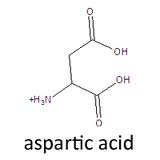Biology
Term: aspartic acid (Asp or D) or L-Aspartate Definition
Definition
- Gene Mutation
A gene mutation is a change in one or several bases. A base may be added, deleted, or substituted with another base. This is caused often through the action of damaging chemicals, radiations, or through errors inherent in DNA replication and repair reactions....
- Amino Acid Activation
Codons of an mRNA molecule contain genetic messages that are carried by the mRNA and they need to be translated to form the corresponding sequence of amino acids that will form the polypeptide chain and subsequently the protein. The tRNA transfers amino...
- Glycine (gly C)
Term: glycineLiterally meaning: ?pertaining to sweet?Origin: Anc Greek??????/glykys (=sweet) >????/lyki(=pleasant, bright)Coined/History In 1818 the French chemist Henri Braconnot(1780-1855) isolated glycine from gelatin and named it ?sucrede...
- Leucine (leu L)
Term: leucineLiterally meaning: ?pertaining to white?Origin: Anc Greek??????/leukos(=white)Coined/History Leucine was isolated in 1818 by French chemist Joseph Louis Proust (1754-1855) from cheese in a white crystalline state. Finally it...
- Proteins
PROTEINSProteins are polypeptides. i.e., linear chains of amino acids linked by peptide bonds. A Peptide bond is formed when ?COOH group of one amino acid reacts with ?NH2 group of next amino acid by releasing a molecule of water (dehydration). Proteins...
Biology
aspartate or aspartic acid (Asp or D)
Literally meaning: ?pertaining to asparagine?
Origin: Anc Greek
??? ????????? (plant)/asparagos(asparagus) >???????(=vigor)
Coined/History
Asparagine was isolated in 1806 by French chemist Louis Nicolas Vaquelin (1763-1829) and named by French chemist Pierre Jean Robiquet(1785-1838) because it was isolated by asparagus juice. The name of aspartic acid was subsequently given in 1927 by Plisson to the acid obtained heating asparagine with lead hydroxide (base).
 Definition
DefinitionAspartic acid is a non essential aino acid. Salt, ester or carboxylate anion of aspartic acid is called aspartate. Aspartic acid plays an important role in Krebs cycle during which other amino acids are synthesized. Aspartic acid is used to treat fatigue as it moves the NADH molecule to mitochondria, where it used to generate ATP (energy). Aspartame (an artificial sweetener) is made by aspartic acid and phenylalanine.
- Gene Mutation
A gene mutation is a change in one or several bases. A base may be added, deleted, or substituted with another base. This is caused often through the action of damaging chemicals, radiations, or through errors inherent in DNA replication and repair reactions....
- Amino Acid Activation
Codons of an mRNA molecule contain genetic messages that are carried by the mRNA and they need to be translated to form the corresponding sequence of amino acids that will form the polypeptide chain and subsequently the protein. The tRNA transfers amino...
- Glycine (gly C)
Term: glycineLiterally meaning: ?pertaining to sweet?Origin: Anc Greek??????/glykys (=sweet) >????/lyki(=pleasant, bright)Coined/History In 1818 the French chemist Henri Braconnot(1780-1855) isolated glycine from gelatin and named it ?sucrede...
- Leucine (leu L)
Term: leucineLiterally meaning: ?pertaining to white?Origin: Anc Greek??????/leukos(=white)Coined/History Leucine was isolated in 1818 by French chemist Joseph Louis Proust (1754-1855) from cheese in a white crystalline state. Finally it...
- Proteins
PROTEINSProteins are polypeptides. i.e., linear chains of amino acids linked by peptide bonds. A Peptide bond is formed when ?COOH group of one amino acid reacts with ?NH2 group of next amino acid by releasing a molecule of water (dehydration). Proteins...
